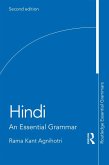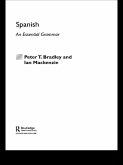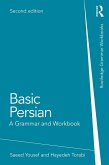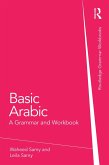

Alle Infos zum eBook verschenken

- Format: PDF
- Merkliste
- Auf die Merkliste
- Bewerten Bewerten
- Teilen
- Produkt teilen
- Produkterinnerung
- Produkterinnerung

Hier können Sie sich einloggen

Bitte loggen Sie sich zunächst in Ihr Kundenkonto ein oder registrieren Sie sich bei bücher.de, um das eBook-Abo tolino select nutzen zu können.
This second edition of Georgian: A Learner's Grammar is a completely revised and updated guide to the fascinating and most widely spoken language of the Caucasus. Presenting the language in the form of dialogues and reading passages, full attention is given to script reproduction and recognition, pronunciation, lexis and individual points of grammar. Key features include: * highlighting of verbal roots throughout * new and varied exercises for practice of verb forms * use of the new Georgian currency * examples of Georgian literature, both poetry and prose, and each with its own self-contained…mehr
- Geräte: PC
- mit Kopierschutz
- eBook Hilfe
- Größe: 7.01MB
![Georgian (eBook, ePUB) Georgian (eBook, ePUB)]() George HewittGeorgian (eBook, ePUB)65,95 €
George HewittGeorgian (eBook, ePUB)65,95 €![Hindi (eBook, PDF) Hindi (eBook, PDF)]() Rama Kant AgnihotriHindi (eBook, PDF)39,95 €
Rama Kant AgnihotriHindi (eBook, PDF)39,95 €![Spanish: An Essential Grammar (eBook, PDF) Spanish: An Essential Grammar (eBook, PDF)]() Peter T BradleySpanish: An Essential Grammar (eBook, PDF)39,95 €
Peter T BradleySpanish: An Essential Grammar (eBook, PDF)39,95 €![Basic Persian (eBook, PDF) Basic Persian (eBook, PDF)]() Saeed YousefBasic Persian (eBook, PDF)39,95 €
Saeed YousefBasic Persian (eBook, PDF)39,95 €![Basic Arabic (eBook, PDF) Basic Arabic (eBook, PDF)]() Waheed SamyBasic Arabic (eBook, PDF)39,95 €
Waheed SamyBasic Arabic (eBook, PDF)39,95 €![Amdo Tibetan: A Comprehensive Grammar Textbook (eBook, PDF) Amdo Tibetan: A Comprehensive Grammar Textbook (eBook, PDF)]() Kuo-Ming SungAmdo Tibetan: A Comprehensive Grammar Textbook (eBook, PDF)76,95 €
Kuo-Ming SungAmdo Tibetan: A Comprehensive Grammar Textbook (eBook, PDF)76,95 €![Fundamentals of Arabic Grammar (eBook, PDF) Fundamentals of Arabic Grammar (eBook, PDF)]() Mohammed SawaieFundamentals of Arabic Grammar (eBook, PDF)60,95 €
Mohammed SawaieFundamentals of Arabic Grammar (eBook, PDF)60,95 €-
-
-
* new and varied exercises for practice of verb forms
* use of the new Georgian currency
* examples of Georgian literature, both poetry and prose, and each with its own self-contained vocabulary * a reference section providing an answer key, a Georgian-English glossary and an index of grammatical terms. With a varied and extensive range of exercise work, this new edition provides a comprehensive and carefully graded grammar of Georgian that has been successful over a number of years of use in the classroom.
Dieser Download kann aus rechtlichen Gründen nur mit Rechnungsadresse in A, B, BG, CY, CZ, D, DK, EW, E, FIN, F, GR, HR, H, IRL, I, LT, L, LR, M, NL, PL, P, R, S, SLO, SK ausgeliefert werden.
- Produktdetails
- Verlag: Taylor & Francis eBooks
- Seitenzahl: 496
- Erscheinungstermin: 21. Juni 2005
- Englisch
- ISBN-13: 9781134316588
- Artikelnr.: 43071094
- Verlag: Taylor & Francis eBooks
- Seitenzahl: 496
- Erscheinungstermin: 21. Juni 2005
- Englisch
- ISBN-13: 9781134316588
- Artikelnr.: 43071094
- Herstellerkennzeichnung Die Herstellerinformationen sind derzeit nicht verfügbar.
yourself and others The Nominative case of nouns Adjective-agreement with
Nominative nouns The formation of adverbs Asking questions (including some
formal set-expressions) Some locative expressions The personal pronouns,
possessive pronouns and adjectives The Present tense forms of the verbs
'be', 'come/go', 'run', 'be sitting, standing, lying'. Lesson 2. The plural
of nouns Dative and Genitive case-forms Adjective-agreement with Datives
and Genitives The form of demonstrative adjectives outside the Nominative
Directional preverbs Numbers (cardinals and ordinals) How to tell the time
Days of the week Months of the year The Present tense of the verbs 'stand
up, lie down, sit down' Lesson 3. How to give your age and ask about
another's age The comparative and superlative grades of adjectives and
adverbs The Instrumental case Adjective-agreement with the Instrumental
More of the language's postpositions The past tense of the copula, the
basic verb of motion, the stative forms 'be sitting, standing, prostrate'
and the dynamic equivalents 'sit down, stand up, lie down'
Subject-agreement markers on the verb Lesson 4. The three-way division of
the tense-system The marking of subject and object with transitive verbs in
the Present (etc.) Word-order The Present Tense of transitive verbs Neutral
Version Verb-agreement with 3rd person plural subjects The loss/reduction
of -o- in the noun-declension The Adverbial case of nouns
Adjective-agreement with nouns in the Adverbial case The postposition -made
'up to' Lesson 5. Subjective Version Indirect Objects Locative Version
Indefinite Pronouns and Adverbs Articles Lesson 6. Future of transitive
verbs Object-agreement affixes Reflexives Emphatics. Lesson 7. Objective
version How to say 'too, also' The emphatic interrogative particle meaning
'pray, on earth!' Relative clauses The potential negative The Vocative case
Adjective-agreement for the Vocative Lesson 8. The syntax associated with
transitive verbs in Series II The Ergative case of nouns
Adjective-agreement with nouns in the Ergative The conjugational patterns
for transitive verbs in Series II Lesson 9. Colloquial relative clauses
Temporal clauses meaning 'when' Temporal clauses meaning 'while' Manner
clauses meaning 'as, like' Temporal clauses meaning 'as soon as' Temporal
clauses meaning 'after' Noun-clauses introduced by 'that' Causal clauses
meaning 'because, as, since' Simple Conditional clauses The Present
Indicative of the verb 'know' Lesson 10. The Present and Future Indicative
forms of intransitive verbs The meaning of this type of intransitive verb
The syntax of intransitives How to associate indirect objects with
intransitive verbs The Future forms of the verbs 'be', 'come/go', 'run',
'be sitting/standing/lying', 'sit down', 'stand up', 'lie down' Lesson 11.
The formation of the Aorist Indicative for intransitive verbs The syntax of
Aorist Intransitives The Present, Future and Aorist Indicative formations
of the Medial verbs The syntax of Medial verbs in Series I and II (Present,
Future, and Aorist Indicatives) Verbs whose tenses can be altered through
use of a Version vowel Lesson 12. The formation of the Aorist Subjunctive
for Transitive, Intransitive and Medial verbs Some uses of the Aorist
Subjunctive How to issue an instruction (Imperatives) How to say 'Don't
VERB!' (Prohibitions) Lesson 13. The essentials of the so-called Stative
Verbs The formation, agreement-patterns and syntax of the so-called
Indirect Verbs in the Present, Future and, where relevant, Aorist
Indicatives (plus the Aorist Subjunctive) How to say 'X wants to VERB' an
yourself and others The Nominative case of nouns Adjective-agreement with
Nominative nouns The formation of adverbs Asking questions (including some
formal set-expressions) Some locative expressions The personal pronouns,
possessive pronouns and adjectives The Present tense forms of the verbs
'be', 'come/go', 'run', 'be sitting, standing, lying'. Lesson 2. The plural
of nouns Dative and Genitive case-forms Adjective-agreement with Datives
and Genitives The form of demonstrative adjectives outside the Nominative
Directional preverbs Numbers (cardinals and ordinals) How to tell the time
Days of the week Months of the year The Present tense of the verbs 'stand
up, lie down, sit down' Lesson 3. How to give your age and ask about
another's age The comparative and superlative grades of adjectives and
adverbs The Instrumental case Adjective-agreement with the Instrumental
More of the language's postpositions The past tense of the copula, the
basic verb of motion, the stative forms 'be sitting, standing, prostrate'
and the dynamic equivalents 'sit down, stand up, lie down'
Subject-agreement markers on the verb Lesson 4. The three-way division of
the tense-system The marking of subject and object with transitive verbs in
the Present (etc.) Word-order The Present Tense of transitive verbs Neutral
Version Verb-agreement with 3rd person plural subjects The loss/reduction
of -o- in the noun-declension The Adverbial case of nouns
Adjective-agreement with nouns in the Adverbial case The postposition -made
'up to' Lesson 5. Subjective Version Indirect Objects Locative Version
Indefinite Pronouns and Adverbs Articles Lesson 6. Future of transitive
verbs Object-agreement affixes Reflexives Emphatics. Lesson 7. Objective
version How to say 'too, also' The emphatic interrogative particle meaning
'pray, on earth!' Relative clauses The potential negative The Vocative case
Adjective-agreement for the Vocative Lesson 8. The syntax associated with
transitive verbs in Series II The Ergative case of nouns
Adjective-agreement with nouns in the Ergative The conjugational patterns
for transitive verbs in Series II Lesson 9. Colloquial relative clauses
Temporal clauses meaning 'when' Temporal clauses meaning 'while' Manner
clauses meaning 'as, like' Temporal clauses meaning 'as soon as' Temporal
clauses meaning 'after' Noun-clauses introduced by 'that' Causal clauses
meaning 'because, as, since' Simple Conditional clauses The Present
Indicative of the verb 'know' Lesson 10. The Present and Future Indicative
forms of intransitive verbs The meaning of this type of intransitive verb
The syntax of intransitives How to associate indirect objects with
intransitive verbs The Future forms of the verbs 'be', 'come/go', 'run',
'be sitting/standing/lying', 'sit down', 'stand up', 'lie down' Lesson 11.
The formation of the Aorist Indicative for intransitive verbs The syntax of
Aorist Intransitives The Present, Future and Aorist Indicative formations
of the Medial verbs The syntax of Medial verbs in Series I and II (Present,
Future, and Aorist Indicatives) Verbs whose tenses can be altered through
use of a Version vowel Lesson 12. The formation of the Aorist Subjunctive
for Transitive, Intransitive and Medial verbs Some uses of the Aorist
Subjunctive How to issue an instruction (Imperatives) How to say 'Don't
VERB!' (Prohibitions) Lesson 13. The essentials of the so-called Stative
Verbs The formation, agreement-patterns and syntax of the so-called
Indirect Verbs in the Present, Future and, where relevant, Aorist
Indicatives (plus the Aorist Subjunctive) How to say 'X wants to VERB' an
'One must congratulate Hewitt on having provided so much useful information. The emphasis throughout is on the spoken language, with which he has an enviable familiarity.'- The Slavonic Review
'As far as Grammar and similar facts are concerned, George Hewitt's writings are always very reliable.'- Winfried Boeder, University of Oldenburg, Germany
'One must congratulate Hewitt on having provided so much useful information. The emphasis throughout is on the spoken language, with which he has an enviable familiarity.'- The Slavonic Review
'As far as Grammar and similar facts are concerned, George Hewitt's writings are always very reliable.'- Winfried Boeder, University of Oldenburg, Germany







